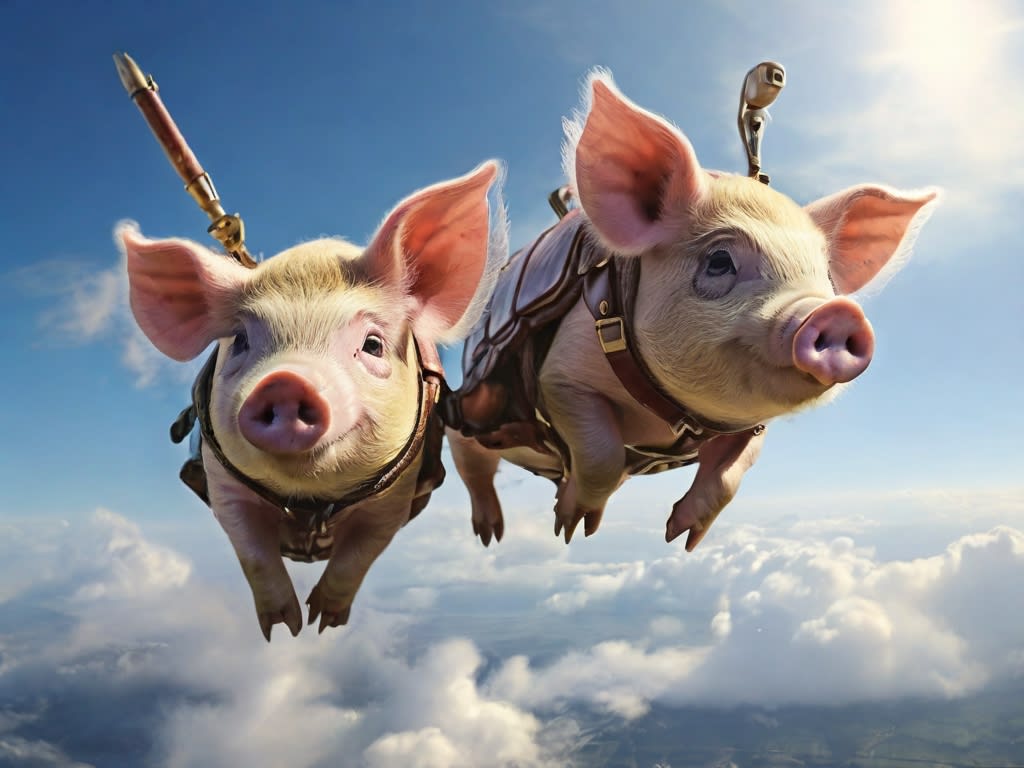George Orwell meets Pink Floyd
Usurping Pigs on the Wing

George Orwell's "Animal Farm" and Pink Floyd's "Animals" are intertwined. Roger Waters, the driving force behind the Album, was inspired by Orwell, and the topic fitted Waters' political views that at that time were less extremist than they are today.
The collaboration of novelists and composers has been frequent throughout history, especially in the genre of Opera. Verdi`s "Rigoletto" is based on Victor Hugo's play "Le roi s'amuse." Franz Lehárs "The Merry Widow" ("Die lustige Witwe") is based on "L'attaché d'ambassade" by Henri Meilhac. But in Rock music? There are examples there as well; take Alan Parsons Project - "Tales of Mystery and Imagination" (1976), inspired by the works of Edgar Allan Poe. Who was the sound engineer behind Pink Floyd's emblematic "Dark Side of the Moon? – Indeed, Alan Parsons. Still, overall, Pink Floyds "Animals" stands out from the crowd.
Orwell's "Animal Farm" and Stalinist Terror
Written during World War II and published amidst the anarchic tumults of 1945, "Animal Farm" was Orwell's metaphoric critique of totalitarianism, inspired by the events of the Russian Revolution and its descent into Stalinist dictatorship. A year later, Churchill spoke of the Iron Curtain, which separates the West from the East. This speech signals that wartime ally Stalin turned into an enemy, presiding over a rotten system of violence. Communism, the old ideal? Ridiculously distorted.
“All animals are equal, but some animals are more equal than others.” (George Orwell, Animal Farm)
Orwell picks up on the geopolitical situation. On a seemingly ordinary farm, animals rise against their oppressive human owner, only to see their egalitarian dream turning into a nightmarish oligarchy under the pigs' rule. The story's brilliance lies in its simplicity. Orwell chose animals, with their inherent stereotypes, to showcase the basic human instincts and the corrupting influence of power.
Echoing Pink Floyd's "Animals"
Thirty-two years after Orwell's novella was published in 1977, Pink Floyd threw "Animals" on the market. The Album was a carefully crafted poetic adaptation not a mere transposition of the novella. Here, the legendary rock band launched their salvo against a capitalist society ignorant of inequities. Such criticism is common with the Floyd, see "Money" on "Dark Side of the Moon" (1973) and "Welcome to the Machine" on "Wish You Were Here" (1975), attacking the music industry.
"You gotta be crazy, you gotta have a real need. You gotta sleep on your toes, and when you're on the street - You gotta be able to pick out the easy meat with your eyes closed. And then moving in silently, down wind and out of sight. You gotta strike when the moment is right without thinkin." (Pink Floyd, Dogs)
Decoding Shared Symbolism

The Dogs: While Pink Floyd's dogs embody the ambitious middle class, chasing dreams often at the expense of morality, Orwell's guard dogs are a bit more sinister, representing unchecked power and mindless allegiance. Both interpretations offer a grim look at how ambition can be weaponized, a feature we find in everyday politics.

The Pigs: Central figures in both narratives, the pigs are the ruling elite. Orwell's pigs, led by Napoleon, begin as agents of change but devolve into tyrants. Floyd's version magnifies the worst of society's leadership: greed, deception, and overarching control.

The Sheep: These are the masses. In Orwell's portrayal, they unquestioningly chant whatever the pigs deem proper. Floyd, on the other hand, offers a more dynamic view. Initially passive, these sheep are hinted to rise against their oppressors eventually.
Have you heard the news? The dogs are dead. You better stay home. And do as you're told. Get out of the road if you want to grow old. (Pink Floyd, Animals)
Power Dynamics and Societal Commentary
Power, in all its incarnations, and inherent corruptibility are central to both "Animal Farm" and "Animals." Orwell demonstrates how revolutions can become the opposite of what they aim at. They underline the cyclical nature of power – how oppressors are often replaced by new oppressors, sometimes worse than their predecessors. Taking a leaf out of Orwell's book, Pink Floyd transposes post-war impressions into societal structures of the 70s, showcasing the cycles of oppression and passive submission. That makes songs like "Dogs" and "Pigs" narratives in their own right.
A Legacy of Resistance and Reflection
The enduring legacy of "Animal Farm" and "Animals" lies in their timeless appeal. They encourage us to question, to resist, and to introspect. While Orwell's work served as a warning against the dangers of totalitarianism, Pink Floyd expanded this narrative to critique societal structures of capitalist societies, too, of which Roger Waters is a life-long critique.
When Orwell's "Animal Farm" was released, it was met with a broad spectrum of reactions. Given the political climate of the time and the novella's sharp critique of Stalinism, it faced its share of censorship and resistance, especially from countries behind the Iron Curtain. However, it was applauded broadly and translated into all major Western languages. Critics praised Orwell's allegories and his political insight. The novel quickly became one of the 20th century's most influential books. Its themes have rendered it timeless, ensuring its continued study in academic settings and its frequent adaptation into various forms of media.
Meanwhile, Pink Floyd's "Animals" emerged in a landscape for its message. The Album was released during political and social upheaval in the UK. A few years after the liberation of an entire generation, the spirit of Woodstock was gone. The Punk Wave came up, and soon after, Reagan, Thatcher, and Kohl engineered a conservative turn.
Music for eternity
The Album, while perhaps less immediately accessible than some of the band's earlier works, was still well-received by critics for its bold thematic content and its innovative soundscape. The Batterfield power plant with flying pics as a cover motif is legendary. The vast inflatable pig called Algie used for the photoshoot escaped his guards. Marksmen with firearms were hired to prepare for the worst but did not arrive in time. You can imagine the reaction of the control tower of Heathrow Airport when pilots reported a flying pig close to the airfield heading towards Germany.
About the Creator
Jurgen Dieringer
J Dieringer is a professor of international relations by profession and a musician, writer, and chess player by passion. He strives to merge those inputs and tackle the intersection of arts and science.
Enjoyed the story? Support the Creator.
Subscribe for free to receive all their stories in your feed. You could also pledge your support or give them a one-off tip, letting them know you appreciate their work.






Comments
Jurgen Dieringer is not accepting comments at the moment
Want to show your support? Send them a one-off tip.